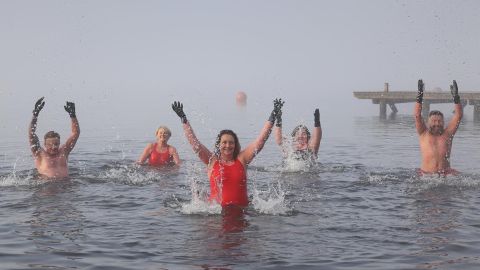CNN
—
As summer approaches and temperatures begin to rise, more and more of us will hit the water in search of a range of body and mind benefits.
Not a running fan? Swimming may not only be a good alternative, but also a more efficient one.
Swimming engages all muscles and provides a full body workout. According to Swim England, 30 minutes of exercise in the water is equivalent to 45 minutes on land.
Even a leisurely swim can burn more than 400 calories an hour, more than double that of walking.
The comparatively low impact of water activities as opposed to running make them perfect options for those caring for minor injuries as well as the elderly.
And it’s not just short-term gains, there are lasting benefits to swimming too.
According to a 2017 report by Swim England’s Swimming and Health Commission, regular swimmers have a 28% reduced risk of early death and a 41% reduced risk of dying from heart disease and stroke.
While the physical benefits of swimming are well documented, the mental health benefits of getting in the water are less well known but just as powerful.
In 2019, nearly half a million Brits with a mental health diagnosis said swimming had reduced their visits to a doctor, according to Swim England.
In particular, swimming in open water – with its naturally colder temperatures – is increasingly seen as beneficial for mental health.
For those willing to brave the cold, the feel-good hormone dopamine is released when stepping into cold water, providing an endorphin rush that can last hours after toweling off.
Research on the anti-inflammatory properties of cold water by the University of Portsmouth in the UK has provided a growing body of anecdotal evidence that it can dampen the inflammatory responses that cause anxiety and depression.
It is well known that just being in a so-called “blue environment” near the ocean or a body of water lowers stress responses.
Writing for CNN last summer, Frontline contributor Dr. Mark Lieber on the transformative effects of even short dips in the pool to literally and figuratively alleviate the previous year’s weight.
“My first thought as I dove below the surface of the water was that I was feeling a little more serene than usual, probably due to the extra pounds brought on by the quarantine,” Lieber said.
“But as I continued to slide through the water, my initial concern about gaining weight was replaced by a feeling of catharsis, as if the water were cleansing me of the stress accumulated during the coronavirus pandemic.
“Stroke after stroke, I could feel my spirits lift, my mind clear and my body relax.”
Rachel Ashe, Founder of Mental Health Swims, is living proof of the mental benefits of open water swimming.
Based in the UK, Mental Health Swims is a volunteer-run peer support community that organizes open water meetings across the UK.
After receiving her mental health diagnosis in 2018, Ashe initially took up running but lost confidence after a few scary slips on ice over the winter.
By the end of the year, she was “really uncomfortable” and “everything was challenging,” but on New Year’s Day, Ashe – literally – immersed herself in a new future.
Despite the ‘Loony Dook’ – an annual event that sees intrepid participants take to the frigid waters near Edinburgh, Scotland – Ashe returned to the beach shivering but changed.
“It was very painful and I didn’t enjoy it,” Ashe told CNN Sport, “but the very alien feeling of connection with my body after living unhappily in my poor mind for so long was a real revelation moment for me. ”

Six months later, 30 people joined Ashe for a swim meet and the group’s growth has been exponential since, even during the pandemic.
This year, Mental Health Swims will host over 80 swim meets – from Cornwall in South West England to Loch Lomond in Scotland – led by trained volunteer swim organizers with a focus on inclusion and peer support.
The reasons for joining vary. For some, it’s the sense of community, while others are looking for mindfulness and the post-swim endorphin boost.
Ashe loves the water as an alternative safe haven from the intimidating environment of the gym, a passion that has breathed new life into her mental health.
“I’ve learned that my differences are a strength rather than something to be ashamed of,” Ashe said. “I never thought I could do the things I’m doing today.
“I’ll always have a mental illness, but I’m much better at taking care of myself these days. I still have great feelings, but with medication, therapy, outdoor swimming, and healthy, happy relationships, I’m doing really well.

Few are better placed to discuss the physical and mental benefits of swimming than Sarah Waters, who lives in the coastal region of Cornwall.
Waters was diagnosed with rheumatoid arthritis while at university and has lived with symptoms of the chronic inflammatory disease for over a decade.
Harsh treatments and medication proved massively draining, and after she returned from traveling and working in Australia, a lump on her neck was revealed to be skin cancer.
The physical and emotional toll of the surgeries to remove the cancer and the switch in treatments has been compounded by the need for protection during the pandemic, but Waters’ fortunes turned a corner when – after a little nudge from her mother – she got involved started swimming in the sea.

“She started walking and kept saying, ‘You have to come in, it’s really helping your mental health,'” Waters told CNN.
“When you come out you get a bit frantic, almost like you’ve been woken up in a way. I know this sounds really weird, but it definitely gives you that tingling feeling that you’ve achieved something you never thought you could.”
And so began an obstinate commitment to swimming two to three times a week, even in the winter — sometimes Water’s only way out of the house as he had to shield himself.

From relaxing muscle stiffness and increasing flexibility in the joints, swimming has a number of physical improvements for people with arthritis, according to the charity Versus Arthritis, for which Waters wrote.
For Waters, these physical boosts match the mental health benefits.
“You always get that angst just before you walk in, like, ‘Can you do this?'” Waters said.
“But I do it and afterwards it’s a sense of accomplishment in a way, it’s definitely good for physical and mental well-being.
“With all the meds you can often feel quite tired – when you have a day off you’re just so tired you feel like you don’t have the energy for it – but once you do it revitalizes you.
“Once you start improving your symptoms of anxiety or depression, it can also bring you physical benefits.”
After swimming for the first time in over a year, Dr. Prefer to advance to the start of a four-day work in the hospital’s intensive care unit.
“I usually dread the first of those night shifts,” he said. “But somehow the task seemed more manageable than usual.
“What happens tonight, happens. No matter what happens, there will always be tomorrow.”
